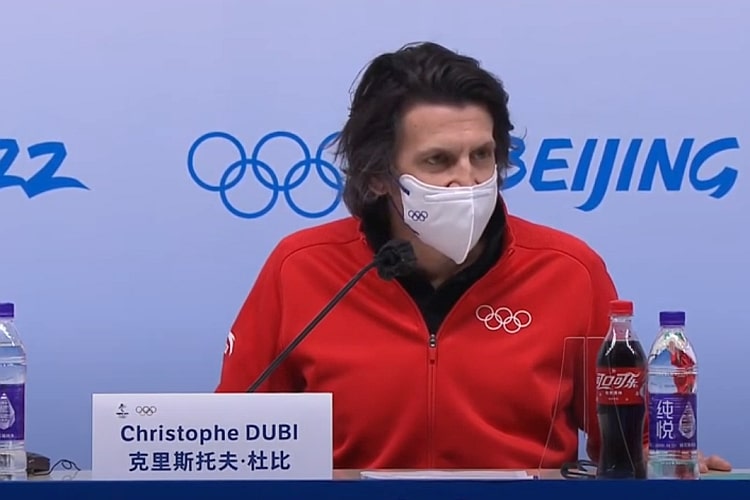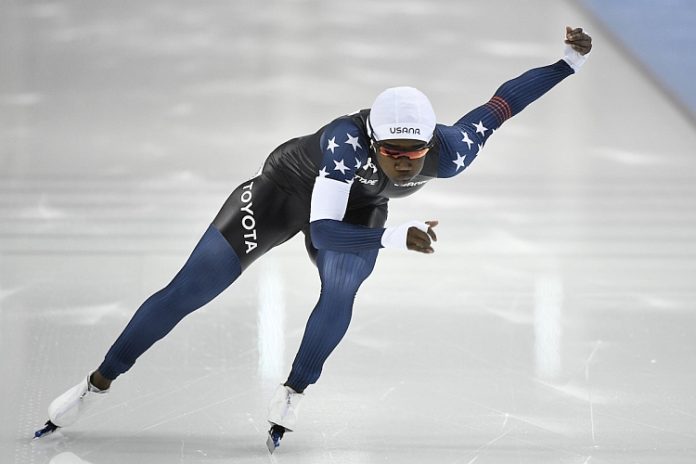(★ Friends: Happy to report that 23 donors have covered 43% of our site costs for services for the first six months of 2022. WOW! If you would like to add your support, please donate here. ★)
= BEIJING 2022 =
From Lane One
Asked to sum up his feelings after the first half of the 2022 Olympic Winter Games, Christophe Dubi (SUI), the International Olympic Committee’s Olympic Games Executive Director said:
“A relief.”
By all accounts, the Games have gone fairly well, with the only major controversy about a doping case that dates back to last December and minor issues on services for Covid-isolated athletes and weather. Dubi explained:
“When you pass the halfway point, and you hear it more from the athletes than any one of us, and they say, ‘This is extraordinary,’ and they post with smiles and joy and positive energy, I say, that first week was indeed full of many achievements, but the main one is the satisfaction of the athletes.
“This is behind us, and it’s already great to have that capital, right? But let’s be very clear as well: we have week two and no issue, no problem is not important enough not to retain our full attention. And when I say, ‘our full attention,’ it’s everything that can be done to improve the situation for any one of us, but starting with the athletes, we have to continue to give the effort.”
He further noted that when complaints surfaced about the space, online access, food and training equipment in some of the Covid isolation facilities, a direct visit was organized in which the visitors all had to wear the hazardous materials suits, from head to toe:
“But then I realized one thing, that a lot of people, including all of us every day, those that help us with the testing, and they are in hazmat suits. And I went also to the Polyclinic in the Village and you have people in hazmat suits. And it’s impersonified. But the one thing I know, because I’ve been in there, is that all of us, we all owe them a huge credit.
“They spend their days in there, trying to smile behind their mask, and it’s complicated. Very complicated. The effort that this organizing committee is putting together, the efforts of the people, of you as the professionals, but also all the volunteers and I see many in the room here, always smiling behind the mask, including those in hazmat suits, I say, ‘hat off’.”
Shuan Yang, the Vice Chair of the Beijing organizing committee, was also positive about the Games so far:
“In general, when we look at the first half of the competition, after the Opening Ceremony, we can see we have world-class competition venues, world-class athletes, world-class operation of the Games and world-class weather service, as well as world-class medical services. So we can see that the Games have been operating very well and reflecting the excellence of the service. …
“Beijing 2022 is being held against the backdrop of the spread of the pandemic globally, so we have overcome a lot of challenges and difficulties to deliver this Games, and this is a reflection of the commitment of the Chinese people and Chinese government to promote the Olympic spirit and movement. It also demonstrates our enthusiasm towards the Olympic Games.”
Reporters noted that some athletes and teams are departing from Beijing as their competitions have ended; it was explained that all Olympic delegates are required to leave China via charters and not by commercial flights. Charters have been arranged to go primarily to Paris, Tokyo and Singapore, but also to Bangkok and London.
¶
Dubi was asked about the “NO WAR IN UKRAINE” sign held up by Ukraine’s Vladyslav Heraskevych after his third run in the men’s Skeleton on Friday evening:
“‘No war’ is a message we can all relate to and this is something that we hope for any people currently suffering because of war conditions, or the prospect of. So this is a message which is incredibly human and moving all of us. …
“I think we really have to relate to this: Olympic Truce as a symbol that it can happen. And if it would happen, wouldn’t the world be a better place? Absolutely. … Just what the world would be if we were all tolerant and respecting each other. This is the power of the symbol.”
IOC spokesman Mark Adams (GBR) added:
“When that case occurred, I think the night before last, we spoke immediately to the team and then we spoke to the athlete and explained the situation to him. As you will see, in his final run, he ran without that; he understood.
“I mean, we all want peace, clearly, and even the President mentioned it in his speech for the opening of the Games: ‘Give peace a chance.’ But everyone is agreed. The athletes themselves have agreed, the field of play and the podium is not a place for any kind of statement because we need to remain politically neutral. And, for us, this is axiomatic: it’s not just part of the upholstery if you like … it is the fundamental core to what we do.
“So, for us, the message was understood, it wasn’t repeated, and I think we can move on from that.”
¶
There was a noticeable difference in stage set the daily briefing on Sunday morning: in addition to the usual bottle of water on the dais for each speaker, a bottle of Coca-Cola – with Chinese lettering, no doubt bottled in China – was also in place.
At least on Sunday, none of the speakers took a drink of either water or soda. Remember that Coca-Cola signed as a TOP sponsor in 2019 in partnership with the China Mengniu Dairy Company Ltd. from 2020-32, combining the non-alcoholic beverage and dairy products categories into a single agreement.
The IOC does not allow commercial signage on the field of play, but at least for Sunday, product placement in press conferences was provided:

¶
The Beijing organizers are under duress from the lack of products featuring the popular, stylized panda mascot Bing Dwen Dwen, but more supply is promised, along with availability through the end of June.
Bing Dwen Dwen has been a huge hit, but ran into some trouble “after the Olympic mascot spoke with a deep masculine voice on a program aired Tuesday by state broadcaster CCTV.”
CNN reported that a complaining message on the Weibo platform – China’s version of Twitter – got 20,000 re-posts, CCTV pulled the program off of its Web site and “[c]ensors also tried to stem the outcry, banning certain hashtags on Weibo like ‘Bing Dwen Dwen started talking.’”
What actually happened was that a reporter wearing the mascot costume was interviewing Chinese Big Air and Slopestyle skier Shuorui Yang. But Olympic protocols stretching back decades advise mascots never to speak.
Japan’s Kyodo News Service reported, “Organizers are going out of their way to protect the secret identity of the mascot, denying the incident ever happened.
“‘It’s a lie (that Bing Dwen Dwen spoke),’ and ‘When did (Bing Dwen Dwen) ever speak?,’ were the responses fans got when they commented on the official Beijing Olympics Douyin account, regarded as the Chinese version of TikTok.”
¶
Sunday’s heavy snow in the mountains in Zhangjiakou caused the Freestyle Skiing Women’s Slopestyle qualifying to be postponed due to poor visibility and safety concerns.
The women’s Slopestyle qualifying will now be on Monday (14th) with finals in Tuesday (15th). The men’s qualifying will also be on the 15th, with the finals on the 16th.
The weather was expected to clear by Monday morning.
¶
The Olympic Covid incidence report for 12 February showed just three total positives: two at the airport across 136 entries and only one among athletes and team officials and none among other stakeholders across 69,558 tests inside the closed loop.
The totals now show 182 total positives (arrivals and inside the closed loop) among athletes and team officials and 319 among all other stakeholders since the closed loop began operations on 4 January.
The U.S. Olympic & Paralympic Committee reported Saturday that there were no new cases among the 570 delegates in Beijing. The number currently isolated is down to one athlete.
¶
No report from NBC on its Friday audience, after 13.2 million watched on Thursday. The biggest primetime audience so far was 13.7 million on Sunday, 6 February; maybe today will be stronger with the Super Bowl also on NBC?
For the first seven days of the Games (not counting the pre-Games telecast), and subject to final confirmation once all of the numbers come in, the average primetime total audience is 12.5 million. That is down 36.8% from the nightly average of 19.8 million for the PyeongChang Games in 2018 and down from the 15.1 million nightly primetime average for the Tokyo Games last summer.
¶
Another good day for Norway – four medals – pushed their leading total to 21 (9-5-7), with Russia also winning four to total 17 (4-5-8) and sit in second place.
At 14 are Germany (8-5-1), Austria (4-6-4) and Canada (1-4-9), with the U.S. (6-5-1) and the Netherlands at 12 (6-4-2).
For a better comparison of team strength, here are our TSX scoring rankings, using the top eight places, via the time-honored U.S. scoring of 10-8-6-5-4-3-2-1. So after 65 of 109 events:
1. 247, Norway
2. 217, Russia
3. 200, Germany
4. 195, Austria
5. 186, United States
6. 166, Canada
7. 148, Italy
8. 147, Netherlands
9. 140, Sweden
10. 125, Japan
11. 112, France
12. 105, China
In another measure of overall team strength, Russia has 49 placements so far in the top eight, followed by Norway (46), the U.S. (42) and Germany with 40. This is a pretty good Games so far for the Russians, despite the doping controversy in figure skating.
~ Rich Perelman
= RESULTS: SUNDAY, 13 FEBRUARY =
● Alpine Skiing: Men’s Giant Slalom
Competing in a snow storm, with bad visibility, is not easy. But it didn’t slow Austria’s Marco Odermatt, the best Giant Slalom skier in the world this season.
Starting fourth in the first run, Odermatt displaced Henrik Kristoffersen (NOR) as the leader and never looked back. It was snowing so hard that even the television cameras lost sight of the racers on parts of some runs, but Odermatt had the top time at 1:02.93 over Stefan Brennsteiner (AUT: 1:02.97). A total of 35 skiers – out of 89 starters – did not finish the first run.
Then came a five-hour delay while the weather cleared a bit, with the order shuffling again during the second run under still-challenging conditions.
American River Radamus, 24, has shown flashes of brilliance during the season and he had a special second run, moving from ninth into the lead with a combined time of 2:10.95. He was passed by Slovenia’s Zan Kranjec, the eighth-place skier, who ended up with the fastest run of the day and a 2:09.54 total.
Those times kept holding up, and Kristoffersen – fourth in the first run – had a tough time on the second run and fell out of the medals. France’s Mathieu Favre, third in the first run, also had trouble, but his total time of 2:10.69 moved him past Radamus and into second place. After Brennsteiner had a tough second run, it was up to Odermatt.
He came through with the second-best second run in the field and won the gold medal in 2:09.35, confirming his status as the finest Giant Slalom racer in the world. It was the second straight Olympic Giant Slalom gold for Austria, following Marcel Hirscher’s win in 2018.
● Biathlon: Men’s 12.5 km Pursuit ~ Women’s 10 km Pursuit
France’s Quentin Fillon Maillet, the undisputed favorite, skied away from Norwegian star Johannes Thingnes Boe on the third of five loops to win going away, in 39:07.5.
Fillon Maillet won four of the five Pursuit races held during the World Cup season so far and won his second race of the Games, after taking the 20 km Individual race.
The Frenchman shot clean, while Boe was uncharacteristically wild, with seven penalties that took him from the lead to fifth overall.
Russia’s Eduard Latypov moved up to try to challenge Fillon Maillet in the last half of the race, racing against Tarjei Boe (the older brother) and Austria’s Lucas Hofer. But Tarjei Boe had the fastest last loop in the field and ended up with the silver medal in 39:36.1, 28.6 seconds behind the winner.
Latypov ended up with the bronze by holding off a fading Hofer, 39:42.8-39:56.6. Jake Brown was the top American finisher in 40th.
It was be the third straight gold for France, with Martin Fourcade winning the last two. Latypov won Russia’s first-ever medal in this event.
¶
Norway’s Marte Olsbu Roeiseland was the definite favorite in the women’s 10 km Pursuit, having won four of the five World Cup races this season, and she showed why.
Roeiseland led from the start, had only one penalty and was never challenged, winning by 1:36.5 over Sweden’s Elvira Oeberg, 34:46.9-36:23.4. Roeiseland had a 32.4-second lead after the first loop!
Oeberg was second for much of the race, faded to sixth in the middle, but then charged ahead to win the silver. Norway’s Tiril Eckhoff was as far down as 14th in the middle of the race, but had the fastest final loop in the field and got the bronze, 36:35.6-36:45.8 over Hanna Sola (BLR).
Joanne Reid was the top U.S. finisher in 29th.
Roeiseland won her second gold of these Games – also the Sprint – and she’s not done yet. It was Norway’s first-ever gold in this event.
● Cross Country Skiing: Men’s 4×10 km Relay
Alexey Chervotkin and Alexander Bolshunov forged a 59.5-second lead after the two Classical legs and led Russia to a decisive win in the relay – in snowy conditions – by more than a minute over Norway.
The Norwegians were second after two legs, but well behind and Hans Christer Holund and Johannes Hoesflot Klaebo could not make up any ground on Denis Spitsov and Sergey Ustiugov on the Freestyle legs. The final times showed Russia at 1:54:50.7 to 1:55:57.9 for the Norwegians.
France was third (1:56:07.1), with Maurice Manificat earning the bronze medal with a strong final leg over Sweden (1:57:00.4). The U.S. finished ninth.
This was Russia’s first-ever win in the relay; the USSR won in 1956-72-80.
● Short Track: Men’s 500 m ~ Women’s 3,000 m Relay
No doubt about the sprint gold: this was Shaoang Liu’s show from the start.
The Hungarian star won his heat, quarterfinal, semi and the final to win country’s first medal in this event. He beat Russia’s surprise silver medalist Konstantin Ivliev, 21, who had not been a factor in the World Cup, but emerged as the European 500 m winner earlier in the season, by daylight: 40.338-40.431.
Canadian Steven Dubois was advanced to the final after finishing fourth in his semi while Korean star Dae-heon Hwang was disqualified. Dubois came through and took the bronze in 40.669, It’s the third time in the last four Games that Canada has been third in this event.
The top American was Ryan Pivirotto, eliminated in the quarterfinals.
¶
Netherlands was a co-favorite at worst and with star Suzanne Schulting leading the way, turned out to be the best with a 4:03.09-4:03.627 win – in Olympic Record time – over South Korea.
China and Canada were close in third and fourth: 4:03.863 and 4:04.329.
The Dutch and Canada won their semifinals, but the Koreans moved up in the final for the silver. The U.S. was fourth in its semi and was disqualified in the “B” final.
It was the first-ever gold for the Dutch in this event, moving up from the bronze n 2018.
● Speed Skating: Women’s 500 m
She did it!
American Erin Jackson, the World Cup leader at this distance, had to get a break to get into this race, but she made the most of it, winning in 37.04, just a tenth off the Olympic Record.
Jackson finished only third in the U.S. Trials at 500 m, putting her at risk of not being selected as an added competitor under the ISU rules until teammate Brittany Bowe gave up her place to be sure that Jackson made it to Beijing. Bowe said the U.S. needed Jackson in the Games to win a medal, and she was right.
Skating in the next-to-last 14th pair, Jackson took command from the start and easily defeated Poland’s Kaja Ziomek to finally knock Japan’s Miho Takagi off the top of the leaderboard. Takagi, already the 1,500 m silver medal winner, won the fourth pair in 37.12 and could not be replaced as leader until Jackson edged her time by 0.08.
Russia’s Olga Fatkulina was a real threat in the final pairing, but finished in 37.76 for 10th. Instead, it was Angelina Golikova who took the bronze, winning the 13th pairing in 37.21.
It was the first U.S. women’s speed skating win at the Games since Chris Witty’s 1,000 m victory 2002 and the first in this race since Bonnie Blair in 1994.
Bowe ended up in the race after all and finished 16th (38.04) and Kimi Goetz was 18th (38.25). Now it will be Jackson’s turn to root for Bowe, one of the favorites in the 1,000 m, on Thursday.
Elsewhere:
● Curling: Canada, skipped by Brad Gushue, sailed past John Shuster’s U.S. squad, 10-5, but the Americans came back to defeat China, 8-6, to end Sunday at 3-3 in the tournament. That places them sixth at present, with the top four to make the playoffs, with three matches remaining against Denmark (0-5), Italy (1-4) and Switzerland (3-2).
The U.S. women, with Tabitha Peterson as skip, saw Sweden (Anna Hasselborg) score the last five points and win 10-4. Peterson’s rink is tied for third at 3-2, but technically in fifth place with four matches left, against Canada (1-3), Japan (3-1), Korea (2-2) and Switzerland (5-0).
● Ice Hockey: The U.S. men defeated Germany, 3-2, to win Group A and move on as the top seed in the playoffs.
Patrick Hager opened the scoring to give Germany a 1-0 lead, with a power-play goal just 2:00 into the game, but the U.S. responded with a power-play goal of its own at 4:26 by Steven Kampfer.
Matt Knies put the U.S. with a goal at 4:26 of the second period for a 2-1 lead and Nathan Smith scored what turned out to be the game winner at 2:27 of the third. Germany got a second goal with 2:29 to play in the game from Tom Kuhnhackl to close to 3-2 and that’s how it ended. The U.S. out-shot the Germans by 32-26.
The American squad is automatically placed in the quarterfinals and will play the winner of the Slovakia-Germany match on the 16th. With a win, the U.S. would play either China, Canada or Sweden in the semifinals.
Pretty good for a roster that includes 15 current NCAA players, eight European pros and two players from the American Hockey League.
¶
The U.S. women will play Finland, a 7-1 winner over Japan, in the semifinals, while Canada will face Switzerland (which defeated Russia, 4-2).
In group play, the U.S. skated past Finland, 5-2, in their opening match and Canada stomped the Swiss, 12-1.
= PREVIEWS: MON., 14 FEBRUARY =
(4 events across 4 disciplines)
● Bobsled: Women’s Monobob
The Monobob is a new event in the Games in 2022 and was introduced with some controversy.
If the men have two-man and four-man, why aren’t women the same? But here we are and many of the same drivers who pilot strong two-woman teams are at the front of the line in the mono.
The list starts with World Cup seasonal winner, Americans Elana Meyers Taylor, who grabbed four wins and already had to shake off a Covid infection and isolation in Beijing. She won silvers at the last two Games as a driver and a bronze in 2010 as a brakeman.
Kaillie Humphries won two Olympic golds for Canada in 2010 and 2014, married an American and now drives for the U.S.; she won the 2021 World Championship, and had two Monobob World Cup seasonal wins, finishing second overall.
Their biggest challengers figure to be Canadians Cynthia Appiah (four medals) and Christine de Bruin (two wins), who finished 3-4 on the season, followed by Australia’s Breeana Walker (five medals) and German Laura Nolte (four medals, and the 2021 Worlds bronze).
The favorites were at the top of the leaderboard after the first two runs, with Humphries winning both to forge a solid lead at 2:09.10 over de Bruin (2:10.14), Nolte (2:10.32) and Meyers Taylor (2:10.42). Those are gaps of 1.04, 1.22 and 1.32 seconds, which are a lot in bobsled, so Humphries may be on her way to a third Olympic gold.
● Figure Skating: Ice Dance
Chalk.
In sports betting parlance, that’s what an expected outcome is called. In the Rhythm Dance on Saturday, we got chalk.
France’s Gabriella Papadakis and Guillaume Cizeron are World Champions from 2015-16-18-19, but did not compete in 2021 due to Covid concerns. That left the door open for Russia’s Victoria Sinitsina and Nikita Katsalapov, also the 2019 Worlds silver winners, to win their first Worlds gold.
The American duos of Madison Hubbell and Zachary Donohue and Madison Chock and Evan Bates have been dueling for years. Chock and Bates won Worlds medals in 2015 (silver) and 2016 (bronze) and Hubbell and Donohue in 2018 (silver), 2019 (bronze) and 2021 (silver). Both were strong in the Team Event, where the U.S. won silver.
In the Rhythm Dance in Beijing, the French ranked first, Russians second and the two American pairs third and fourth, just as expected. Papadakis and Cizeron scored 90.83, to give them a significant lead over Sinitsina and Katsalapov (88.85), with Hubbell and Donohue close behind with 87.13.
There was some daylight to Chock and Bates (84.14), who were barely ahead of the second Russia team of Alexandra Stepanova and Ivan Bukin (84.09), who were fifth at the 2021 Worlds, and the Canadian pair of Piper Gilles and Paul Porier (83.52), the 2021 Worlds bronze medalists.
Hubbell and Donohue outscored Chock and Bates in the Free Dance at the U.S. nationals in 2022, 136.20-135.43, even though they finished second overall. That makes Hubbell and Donohue slight favorites to win the bronze, although they could challenge for the silver with a sensational performance and one less special from the Russians.
There appears to be no stopping Papadakis and Cizeron, who could become France’s second gold winners in this event, after the 2002 champions, Marina Anissina and Gwendal Peizerat.
● Freestyle Skiing: Women’s Aerials
This event has been held seven times at the Winter Games, with Belarus providing the last two winners and China winning four straight silver medals and five out of six.
It might happen again.
The PyeongChang winner, Hanna Huskova (BLR) is back and won a couple of bronzes on the World Cup circuit this season. She’s a contender. China has two Olympic medal winners in the mix: 2014 silver winner Mengtao Xu, now 31, and Fanyu Kong, the 2018 bronze medalist. Both were busy on the World Cup circuit this season: Xu won twice and scored medals in four of six event, and Kong won the season opener and also won four medals. Xu was 2013 World Champion.
The biggest challenge to these favorites clearly comes from Australia: Laura Peel is the reigning World Champion from 2015 and 2021, and Danielle Scott was the 2013 Worlds bronze medalist and 2017 silver winner. Both had wins on the World Cup circuit.
Breakthrough possibilities include Ukraine’s Anastasiya Novosad and Olga Polyuk, both of whom won World Cup medals this season, and Russian Lyubov Nikitina, the silver and bronze winner in 2014 and 2018.
The U.S. has an experienced team that includes 2017 World Champion Ashley Caldwell and the perfectly-named Winter Vinecki.
● Ski Jumping: Men’s Large Hill Team
Germany has won the last two World Championships golds in this event, has gone silver-gold-silver in the last three Winter Games and placed 3-5-14-28 in the men’s Large Hill final. World Cup leader Karl Geiger leads this squad.
But they are no more than a co-favorite with Slovenia, with a sensational 6-10-11-12 finish with Timi Zajc, Peter Prevc, Lovro Kos and Cene Prevc (younger brother). How about Austria, finishing 7-9-13-20 with Manuel Fettner, Jan Hoerl, Stefan Kraft and Daniel Huber; this team won two of the three World Cup team events this season, with Slovenia taking the other.
Those are the medal favorites; defending champion Norway has Large Hill winner Marius Lindvik and eighth-placer Halvor Egner Granerud, but veteran stars Daniel Andre Tande and Robert Johansson were disappointing in the Large Hill final.
Wild card: Japan, with the brothers Ryoyu and Junshiro Kobayashi, Yukiya Sato and Naori Nakayama.
= BEYOND BEIJING =
● Athletics ● Lots of action on Saturday, including two American Records. There were three world-leading marks at the American Track League Eastern Indoors in Louisville alone!
After little-noticed lifetime bests of 1:46.07 (800 m) and 3:57.98 (mile), former Minnesota and Lipscomb runner Shane Streich won the 1,000 m in 2:16.11 to better Bryce Hoppel’s 2021 standard of 2:16.27. Streich is now no. 8 all-time in the event.
U.S. high jump star Vashti Cunningham won at 1.98 m (6-6) for the 2022 world lead, and American Josh Owotunde got the shot put world lead at 21.53 m (70-7 3/4).
At the second day of the David Hemery Invitational in Boston, Neil Gourley (GBR) won the men’s 1,500 m in a season-leading 3:35.32 from American Josh Thompson (3:37.96), and American Olympian Grant Fisher took the world lead in the men’s 5,000 m with an American Record of 12:53.73, the no. 4 performance in history!
Fisher ran away from Moh Ahmed (CAN: 12:56.87: national record; no. 7 all-time) and Marc Scott (GBR: 12:57.08: national record; no. 8) for the win and shattered his own lifetime (outdoor) best of 13:02.53 in 2021. Fisher, 24, a former Stanford star, was fifth in the Olympic 10,000 m in Tokyo: looks like he is ready for prime time.
Elsewhere, Dutch 400 m hurdles bronze medalist Femke Bol won the 400 m in Meeting Metz Moselle Athelor (GER) in 50.72, fastest in 2022 and later won the 200 m in 23.37.
At the Tiger Paw Invitational at Clemson, Kentucky’s Abby Steiner took the world lead – and set the collegiate record – in the women’s 200 m in 22.37. Another collegiate mark fell to Notre Dame’s Yared Nuguse (USA) in the men’s 3,000 m at 7:38.13.
Worth noting: former Florida State All-American Trey Cunningham won the men’s 60 m hurdles at the Tyson Invitational in Fayetteville, Arkansas in 7.42, second on the season only to world-record holder Grant Holloway (7.37). Cunningham’s 110 m hurdles best is only 13.21 from 2021, so is he primed for big things outdoors?
● Basketball ● The U.S. women crushed Puerto Rico, 93-55, in Washington D.C. to finish 2-0 in the FIBA Women’s World Cup Qualifying Tournament.
The game was over by the end of the first quarter as the U.S. ran out to a 33-8 lead and cruised in from there. Six players scored in double figures: Ariel Atkins (14 points), Allisha Gray (13), Brionna Jones (12) and Dearica Hamby, Kelsey Mitchell and Jewell Loyd all with 10 points. The Americans held Puerto Rico to 37% from the field.
The other games in the group are being played in Santo Domingo (DOM), but Russia will not travel to the U.S. due to Covid protocol complications. The FIBA Executive Committee decided the game will not be played and both teams will be given a point in the standings. The top three teams advance to the FIBA World Cup; the U.S. is already qualified as Olympic Champions from Tokyo 2020.
● Fencing ● The FIE men’s Epee World Cup in Sochi (RUS) saw two fresher faces in the final, Italy’s Valerio Cuomo and France’s Romain Cannone. The Frenchman was the shocking winner of the Tokyo gold medal, and came into the Sochi World Cup having won a grand total of two international medals: Tokyo and a World Cup bronze in November 2021.
Cuomo had never won anything in international competitions, but defeated Tokyo bronze medalist Igor Reizlin (UKR) by 15-13 to move into the final. Cannone was in a re-run of the Tokyo final against silver medalist Gergely Sikosi (HUN) in the other semi, and won again by 15-13.
In the final, Cuomo won his first international medal – a gold – with a 15-9 win over Cannone. What a way to win your first big tournament!
Russia won the team competition over Ukraine, with South Korea taking the bronze.
¶
In the FIE women’s Epee World Cup in Barcelona (ESP), Korea’s Sera Song won her second career World Cup medal and first since 2016 with a 14-13 victory over France’s Marie-Florence Candassamy.
Song was at her best in close matches, winning her round of 32 match by 13-12, her quarterfinal by 13-12, the semi against Russian Aizanat Murtazaeva, 11-10 and then the final by just one point again.
The win was Song’s first ever in an FIE international tournament, after a bronze back in 2016 and a Grand Prix silver in 2020.
For Candassamy, she won her third medal of the FIE season, after a silver in Tallinn (EST) in November and a Grand Prix bronze in Doha (QAT) in late January.
France beat Russia in the team final, with Italy third.
● Gymnastics ● At the Trampoline World Cup in Baku (AZE), Belarus claimed gold and silver in the men’s final, by Ivan Litvonovich (61.850) and Andrei Builou (60.800). American Cody Gesuelli was fifth, scoring 57.300.
Russia’s Irina Kundus won the women’s title at 53.900, ahead of Seijan Mahsudova (BLR: 52.780), with American Maia Amano fifth (50.270).
● Swimming ● More strong swimming from Katie Ledecky, who won the women’s 400 m Freestyle at the Southern Zone South Sectional Championships in Orlando in 4:00.95, her third world-leading mark of the weekend, after earlier wins in the 200 m and 800 m Free.
Olympic sprint superstar Caeleb Dressel claimed the world lead in the men’s 50 m Free in 21.89, defeating Brazil’s Olympic 50 m bronze winner, Bruno Fratus (22.20).
¶
Townley Haas, a standout U.S. middle-distance swimmer who won an Olympic gold in the Rio 4×200 m Free, announced his retirement from swimming on Instagram last night.
Still just 25, Haas won four World Championships golds on relays in 2017 and 2019 and 10 NCAA individual and relay titles at the University of Texas. He finishes with impressive bests of 48.20 for the 100 m Free and 1:45.03 for the 200 m Free (no. 22 all-time; no. 6 U.S.), both from 2017.
● Wrestling ● The U.S. men won their dual meet by 44-1 and the U.S. women by 14-5 against international all-star teams at the Bout at the Ballpark, at Globe Life Field in Arlington, Texas on Saturday, but the most important number was 12,208.
That was the attendance, which saw a U.S. team in action along with Iowa, ranked second nationally, defeating no. 12 Oklahoma State, 23-9 in a collegiate dual.
Sensational? No. But still a positive promotion for the sport, despite Iran pulling out of the men’s dual against the U.S. on short notice.
Former Olympic champions Jordan Burroughs (79 kg) and Kyle Snyder (97 kg) both won on the men’s side and Rio Olympic gold medalist Helen Maroulis was a winner in the women’s matches at 57 kg.
What’s next?
You can receive our exclusive TSX Report by e-mail by clicking here. You can also refer a friend by clicking here, and can donate here to keep this site going.
For our 832-event International Sports Calendar for 2022 and beyond, by date and by sport, click here!























